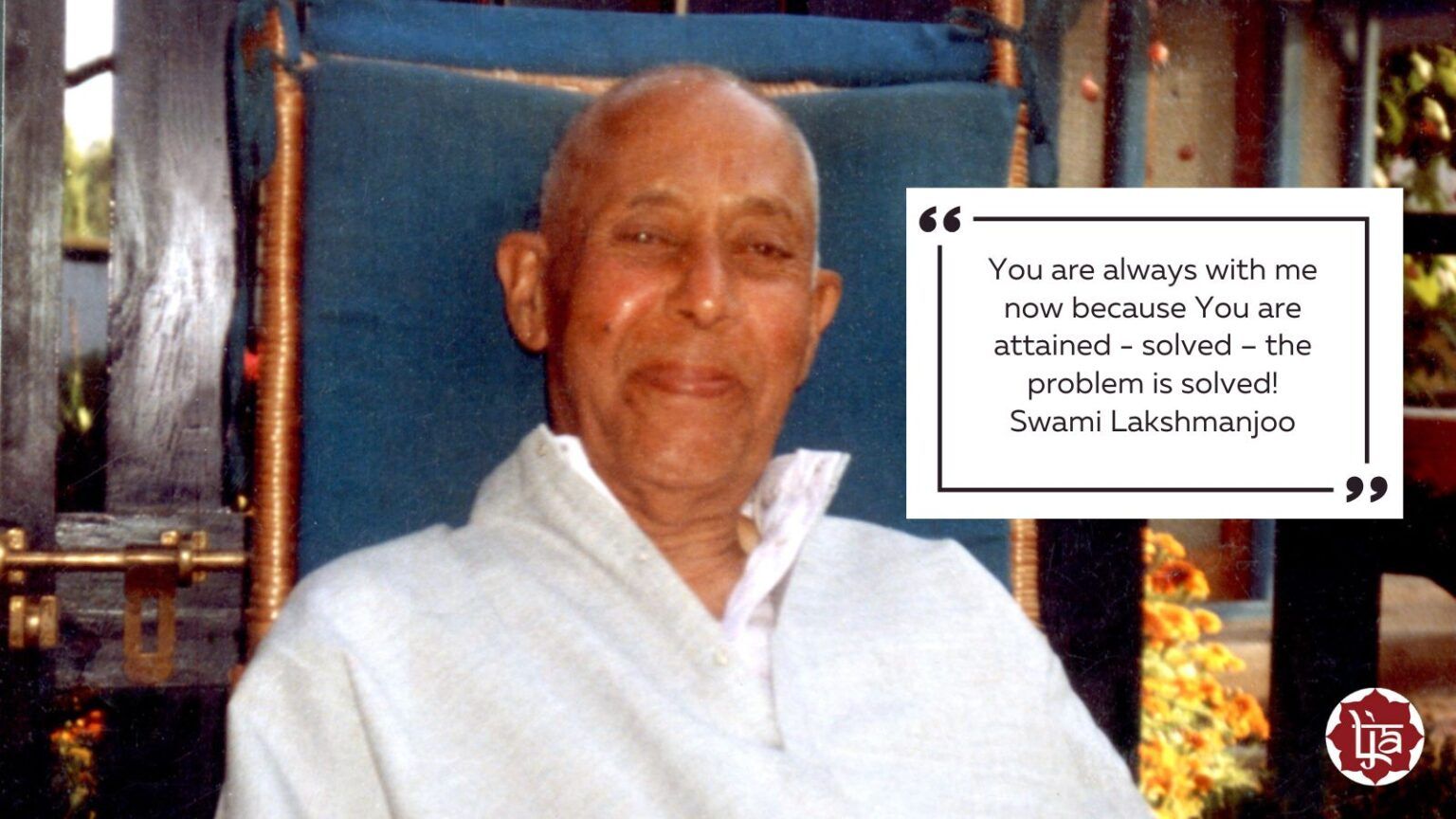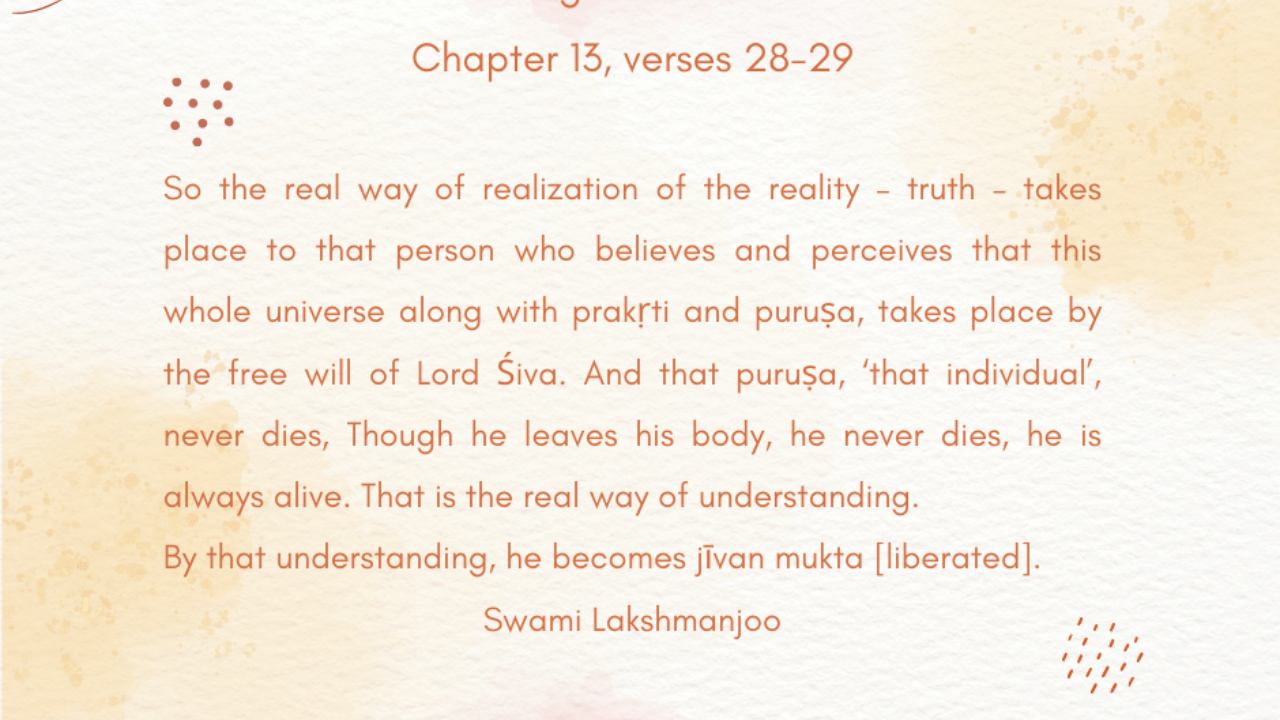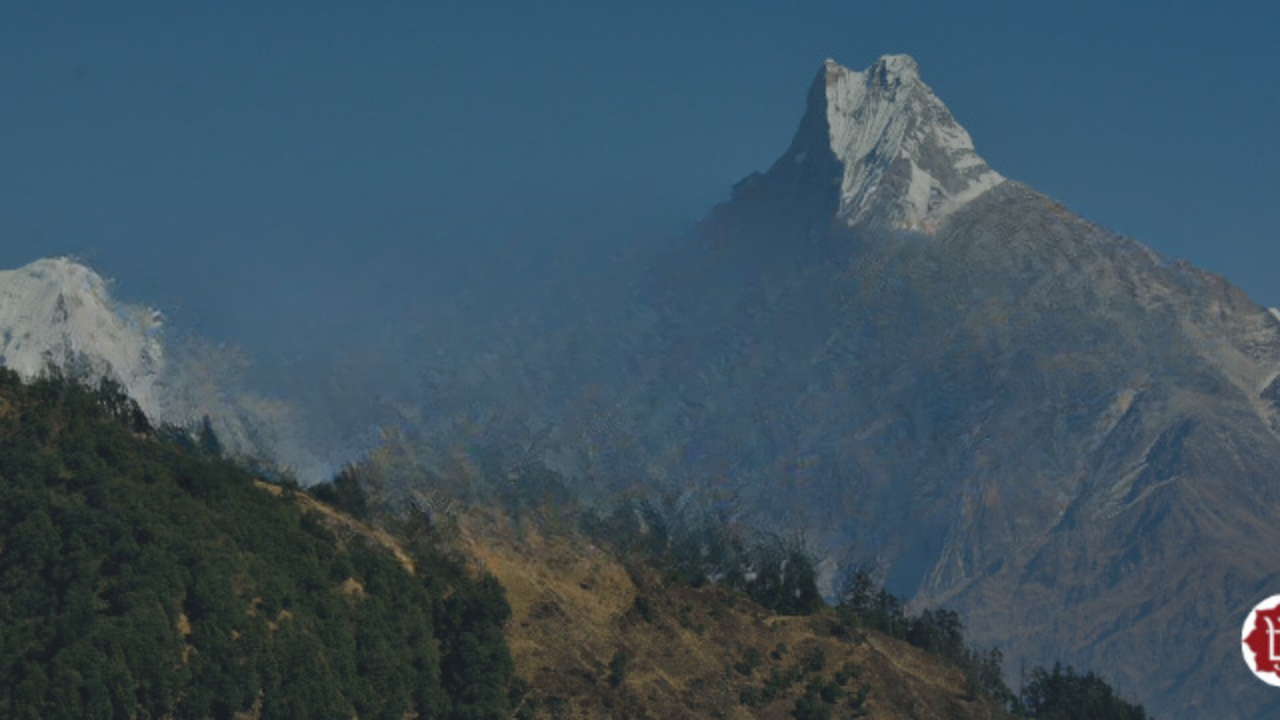
In this excerpt from the book Shiva Sutras: The Supreme Awakening, Swami Lakshmanjoo reflects on the second sūtra of the First Awakening, where Lord Shiva says, “differentiated perception is bondage.” Then, in the the 9th sūtra of the second Awakening, we learn what knowledge means on the level of Shaktopaya, and what we need to do in that state…

9. jñānamannam //
(For such a yogī)
Differentiated perception is his food
or
Knowledge of his own nature is his food.
This yogī ...
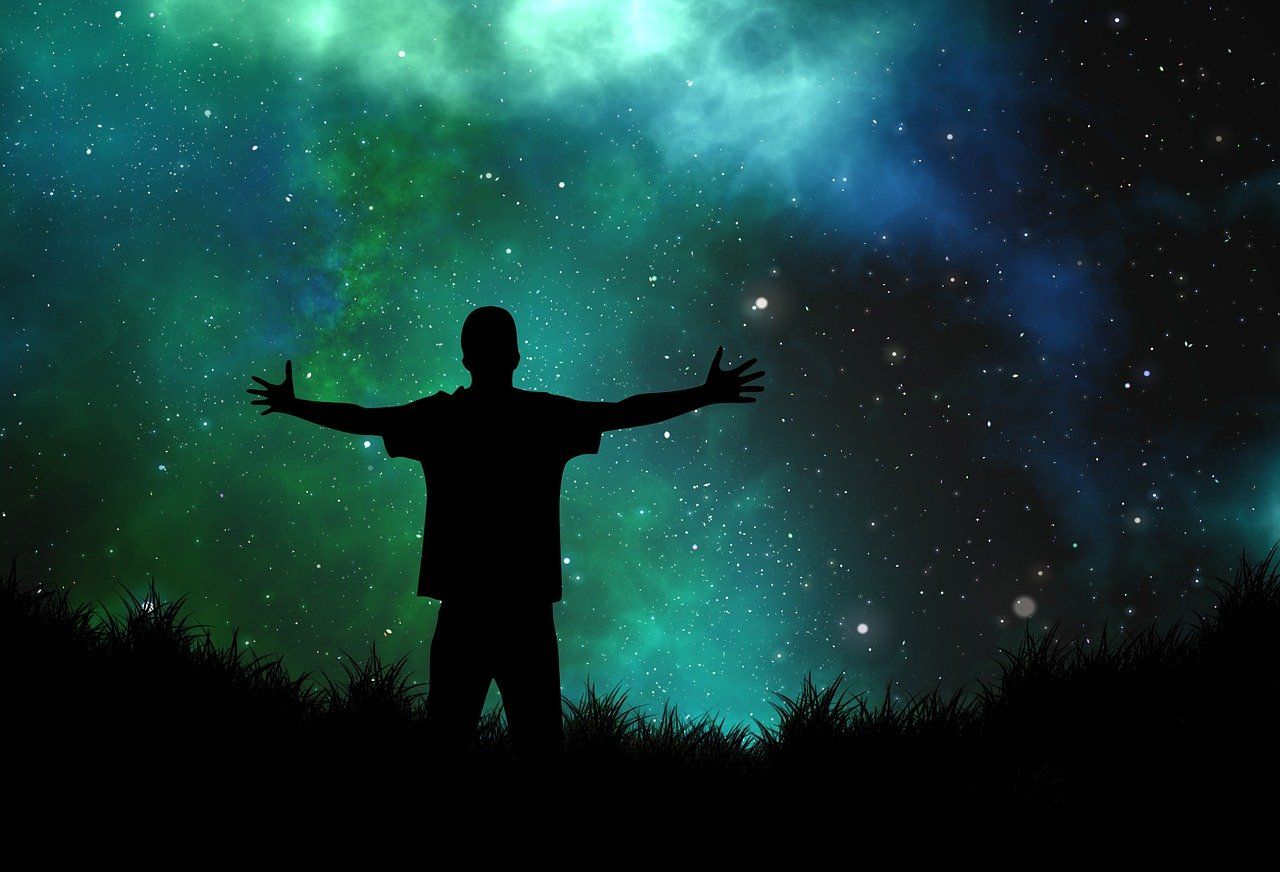
In this excerpt from the Hymns to Shiva, Utpaladeva’s Shivastotravali Swami Lakshmanjoo shares with us how Utpaladeva desired to embrace his Master (Nātha), “just by my will”, because “by Thy embrace I have conquered everything.”
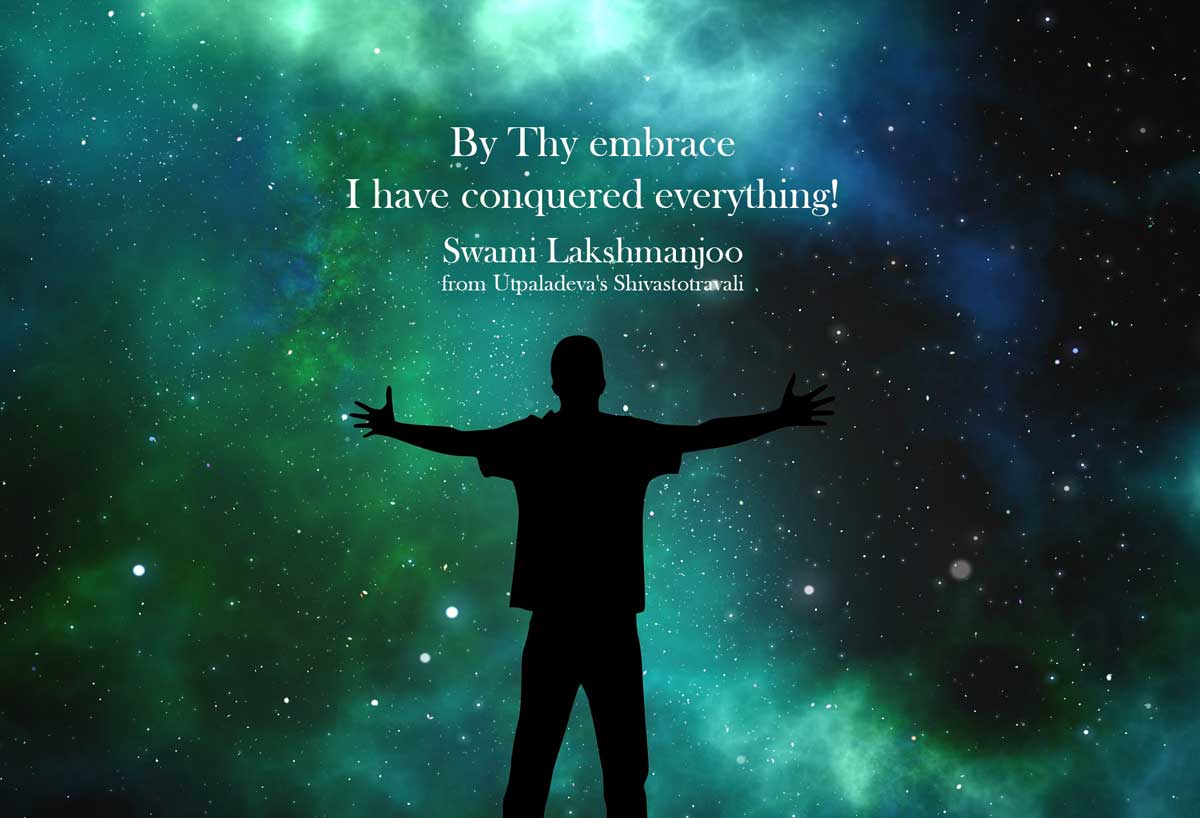
Chapter 6 (15:53)
भवदङ्गपरिष्वङ्गसम्भोगः स्वेच्छयैव मे ।
घटतामियति प्राप्ते किं नाथ न जितं मया ॥१०॥
bhavadaṅgaparisvaṅga sambhogaḥ svecchayaiva me /
ghaṭatāmiyati prāpte kiṁ nātha na jitaṁ mayā //10//
Nātha, O Master, just by my will112–not by action–just
...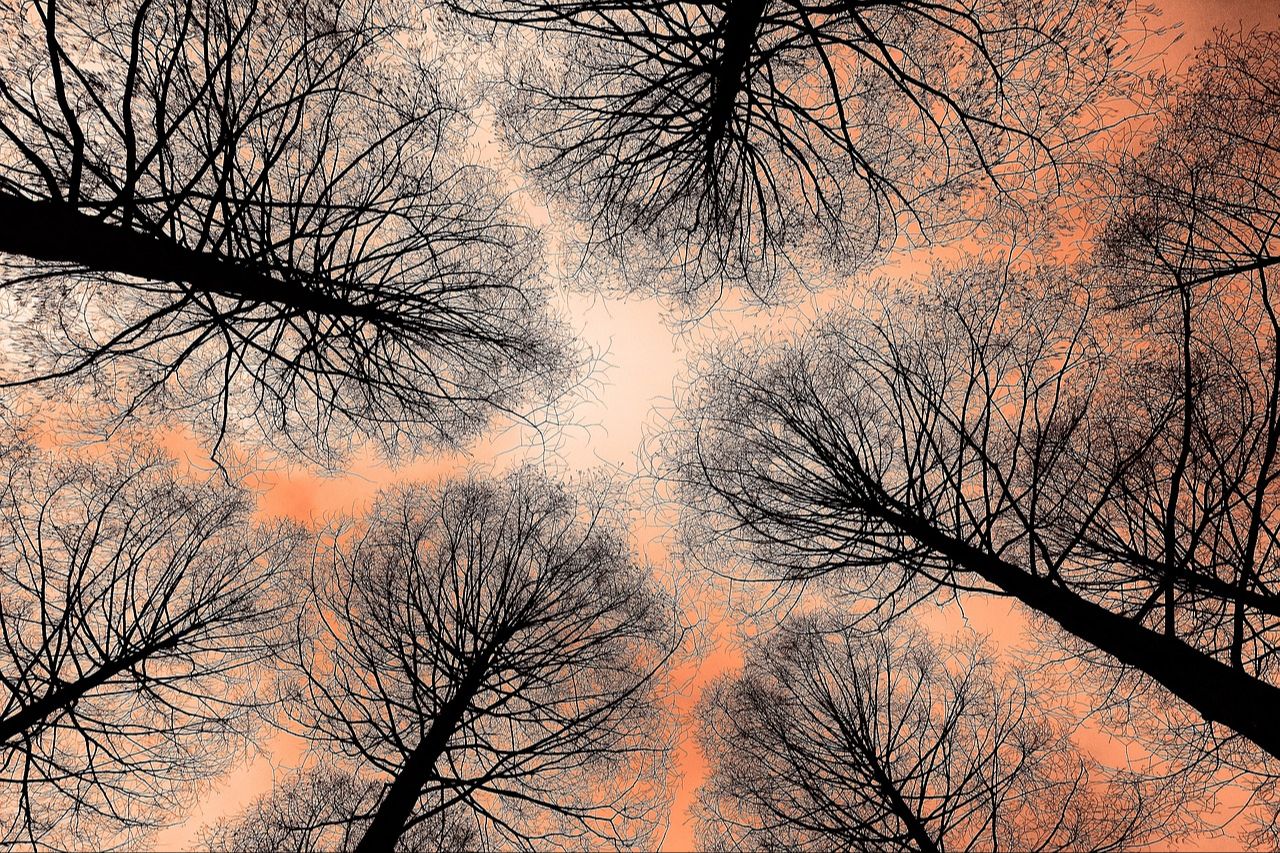
In this excerpt, Swami Lakshmanjoo explains how to understand the question:
“Śivo’haṁ cet, if I would have been Śiva, why these things happen against my wishes in this world?”
[Answer:] You should not say why? [Because,] I’ll make you understand.”
This is an extract from Tantraloka, Āhnika 14, Verse (and commentary) 28-31, (unpublished). Audio Archives Lakshmanjoo Academy. Copyright © John Hughes. Do not use without permission.

In this excerpt from the Hymns to Shiva, Utpaladeva’s Shivastotravali, Swami Lakshmanjoo reveals when this whole differentiated world becomes one offering in the fire of consciousness.
This is an excerpt from our Free Weekly Sangha, where we studied the "Utpaladeva's Hymns to Shiva" in depth. You can find the replays on the same page.
Chapter 3 (21:28)
गर्जामि बत नृत्यामि पूर्णा मम मनोरथाः ।
स्वामी ममैष घटितो यत्त्वमत्यन्तरोचनः ॥११॥
garjāmi bata nṛtyāmi pūrṇā mama manorathāḥ |
svā...
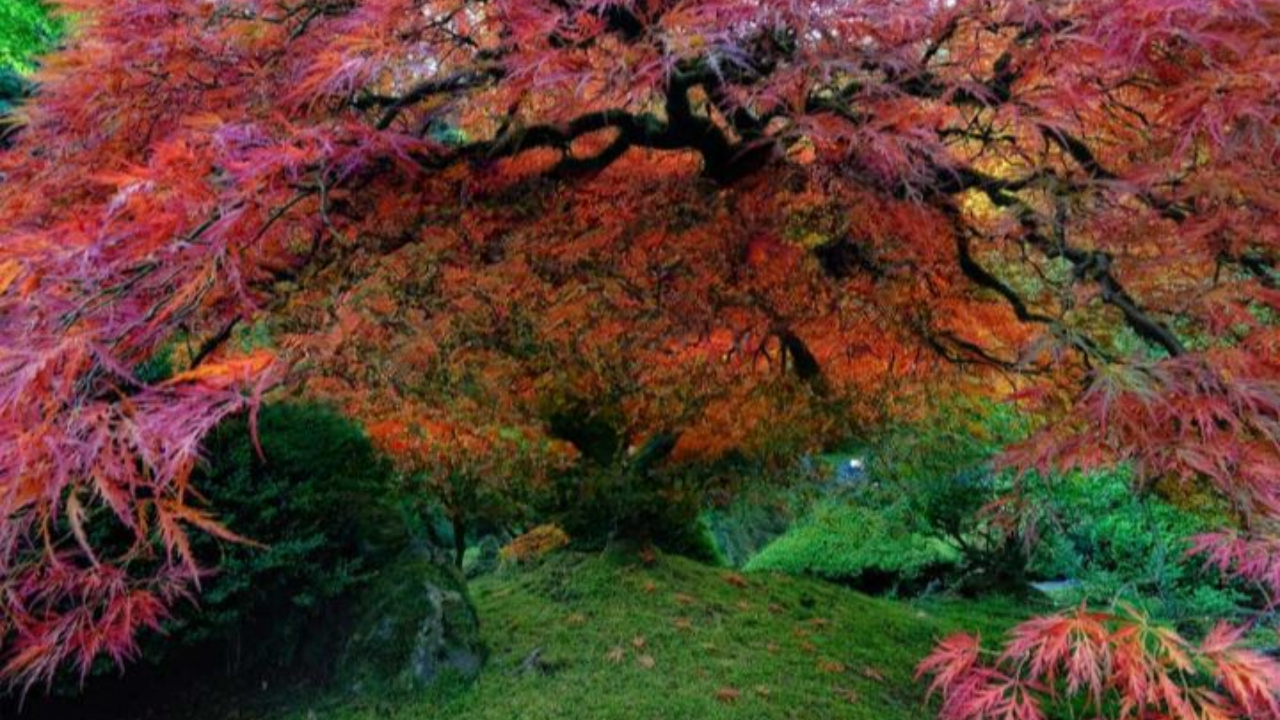
This is a beautiful excerpt from the devotional text of the Hymns to Shiva, Utpaladeva’s Shivastotravali, explained by Swami Lakshmanjoo. In which Utpaladeva asks Lord Shiva: “When that festival will appear to me?”
The Intensity of the Festival of Devotion by Utpaladeva is to get entry in universal God Consciousness.
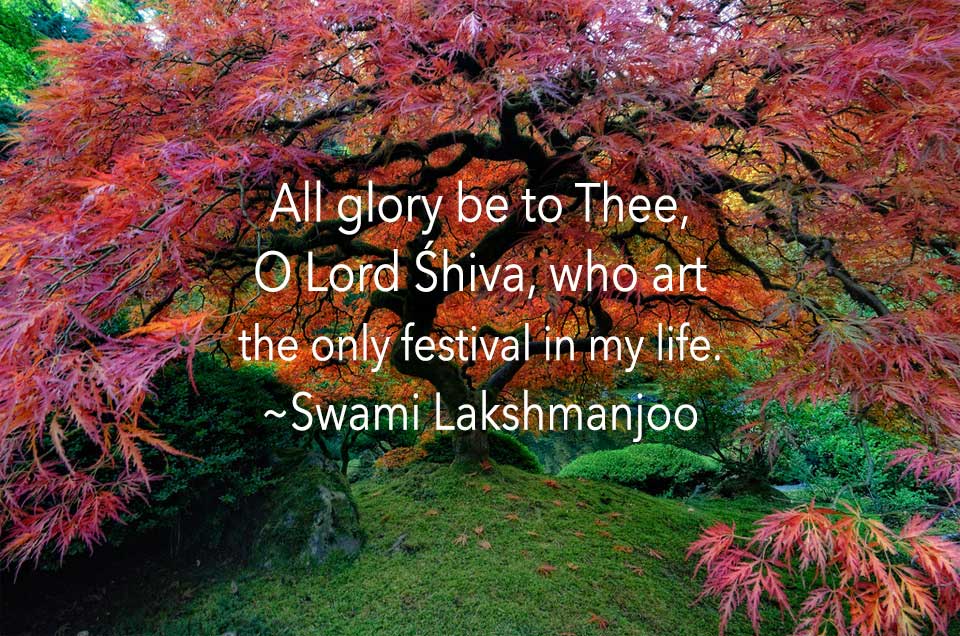
Chapter 9 (11:49)
कदा मे स्यात्विभो भूरि भक्त्यानन्दरसोत्सवः ।
यदालोकसुखानन्दी पृथङ्नामापि लप्स्यते ॥५॥
kadā me syātvibho bhūri bhaktyānandarasotsavaḥ /
yadālokasukhāna...

In this excerpt from the Manual for Self Realization: 112 Meditations of the Vijnana Bhairava Tantra, Swami Lakshmanjoo explains how “Energy is the means by which you can understand and enter in the state of Lord Shiva.”
You can study the previous verses here…
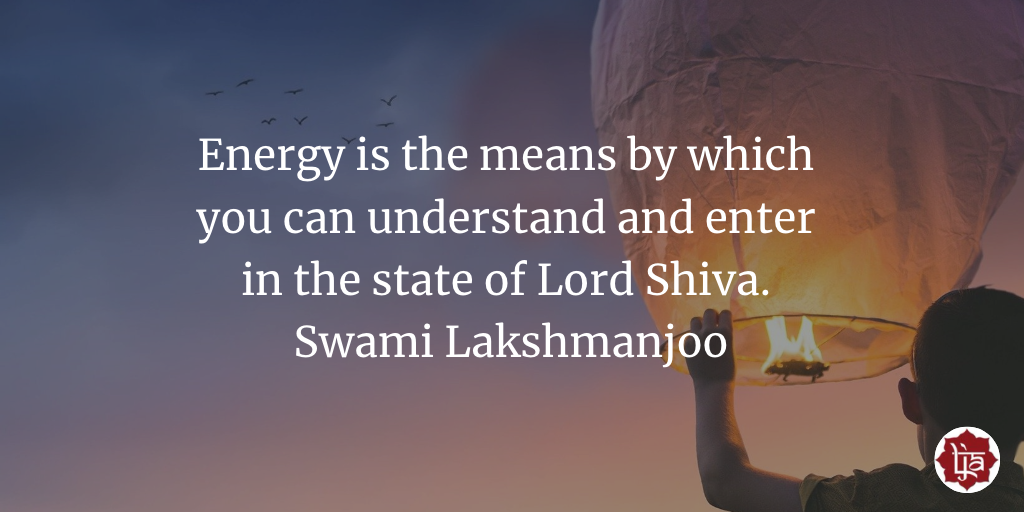
Image by S. Hermann & F. Richter
न वह्नेर्दाहिका शक्तिः
व्यतिरिक्ता विभाव्यते ।
केवलं ज्ञानसत्तायां
प्रारम्भोऽयं प्रवेशने ॥१९॥
na vahnerdāhikā śaktiḥ
vyatiriktā vibhāvyate /
kevalaṁ jñānasattāyāṁ
prārambho’yaṁ praveśane /...
Swami Lakshmanjoo sheds light on Abhinavagupta’s commentary on the Bhagavad Gita, Chapter 4, verses 4–9. Here, Krishna (Lord Shiva) reveals why He manifests His divine presence in the world:
"To protect those who are saints here, and to destroy those who are sinners; for that [reason], I appear from one yuga (age) to another yuga, from that yuga to another yuga, I appear again and again. To see that dharma, the ancient duty, is established properly in this world."

Listen to Swamiji’s explana...
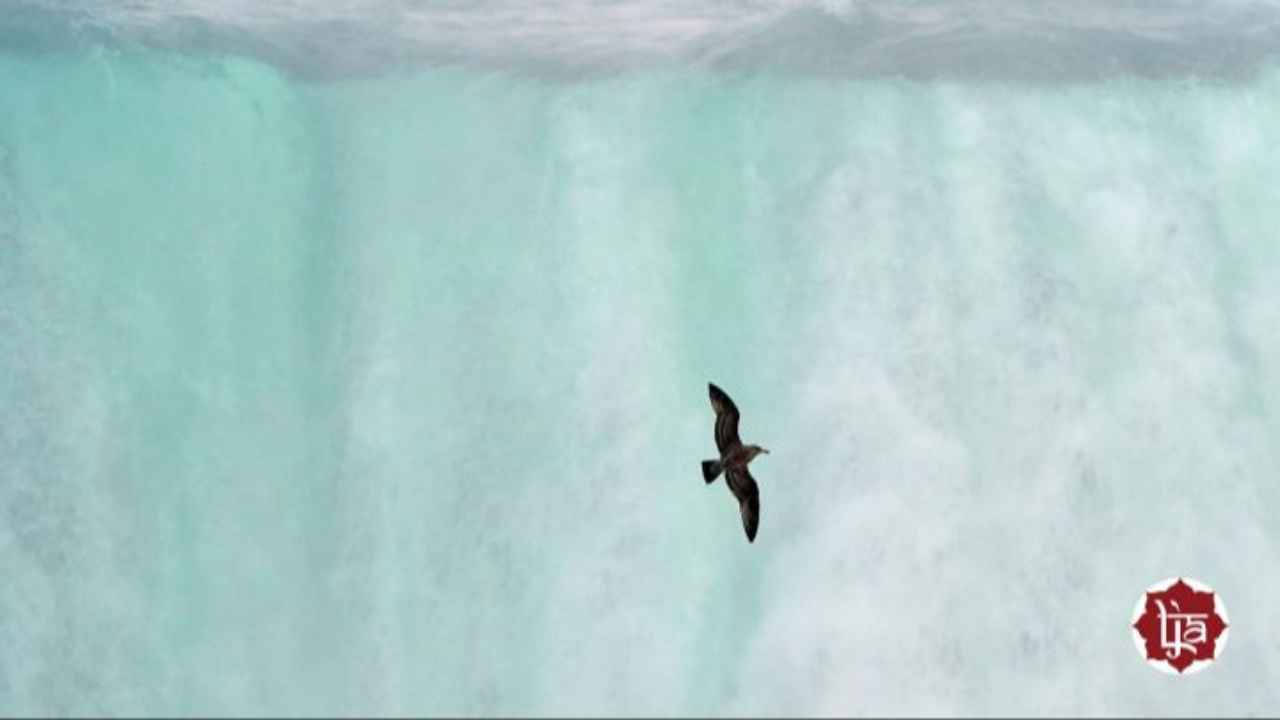
In a letter to John Hughes, dated 13th February 1989, Swamiji wrote the following: “Actually, individuals are not separate from God consciousness…”
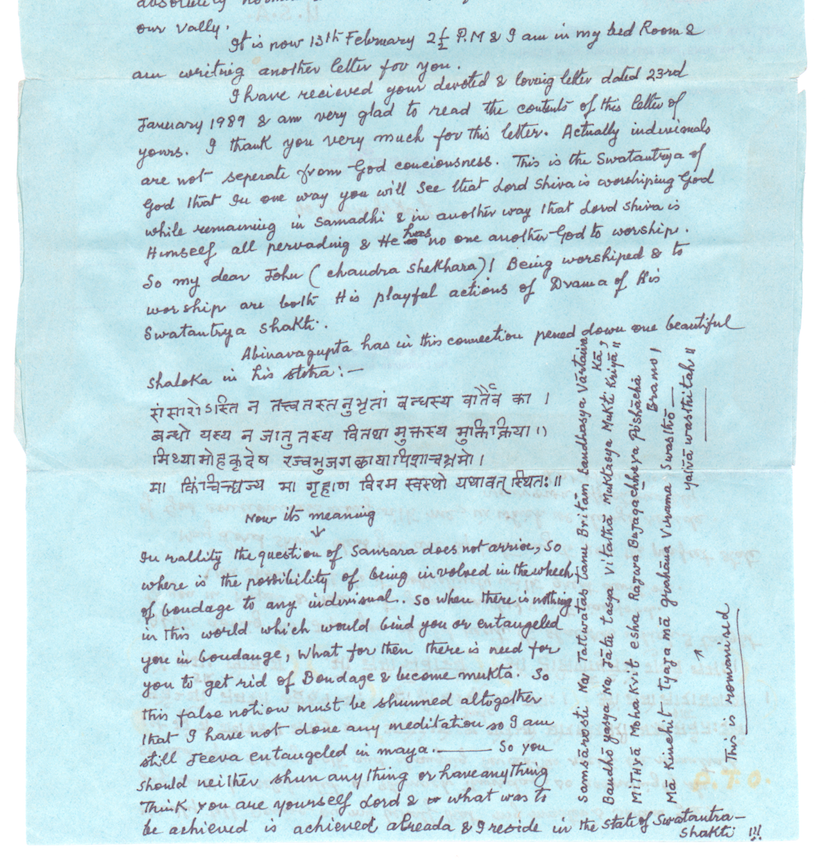
“Actually, individuals are not separate from God consciousness. This is the svātantrya of God that, in one way you will see that Lord Śhiva is worshiping God while remaining in samādhi, and in another way that Lord Śhiva is Himself all-pervading and he has no one, i.e. another God to worship. So my dear John, being worshiped and to worship are ...

In this excerpt from The Magical Jewel of Devotion in Kashmir Shaivism – Stava Cintamani, by Bhaṭṭanārāyaṇa, Swamiji reveals why we need to develop sāttvaguṇa in Kashmir Shaivism.
“The avenue for crossing the cycle of guṇa is through sāttvaguṇa. It is not through rajoguṇa, it is not through tamoguṇa.” ~Swami Lakshmanjoo
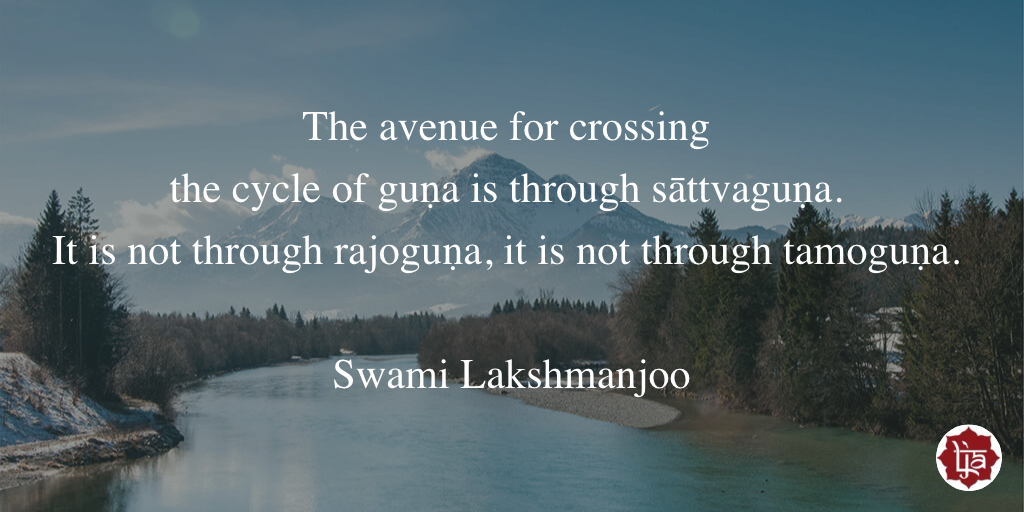
triguṇatriparispanda-dvandvagrastaṁ jagattrayam /
uddhartuṁ bhavato’nyasya kasya śaktiḥ kṛpātha vā //46//
In this three-fold world (jagat trayam, in these three worl...
In this excerpt, from Abhinavagupta’s Bhagavad Gita revealed by Swami Lakshmanjoo, Chapter 13, verses 28-29, Swamiji talks about the real way of realization of reality in Kashmir Shaivism. This is from an unpublished audio recording and we included it in the Weekly Sangha #81 – Bhagavad Gita in the Light of Kashmir Shaivism, where you can learn more about the subject.
Bhagavad Gītā audio (1978)
Chapter 13, verses 28-29
समं सर्वेषु भूतेषु तिष्ठन्तं परमेश्वरम् ।
विनश्यत्स्वविनश्यन्
...
An important excerpt from the 5th verse of the Manual for Self Realization: 112 Meditations of the Vijnana Bhairava Tantra by Swami Lakshmanjoo, explaining why you can’t observe the reality of supreme God consciousness.
God consciousness is not felt; it is your own Self. ~Swami Lakshmanjoo
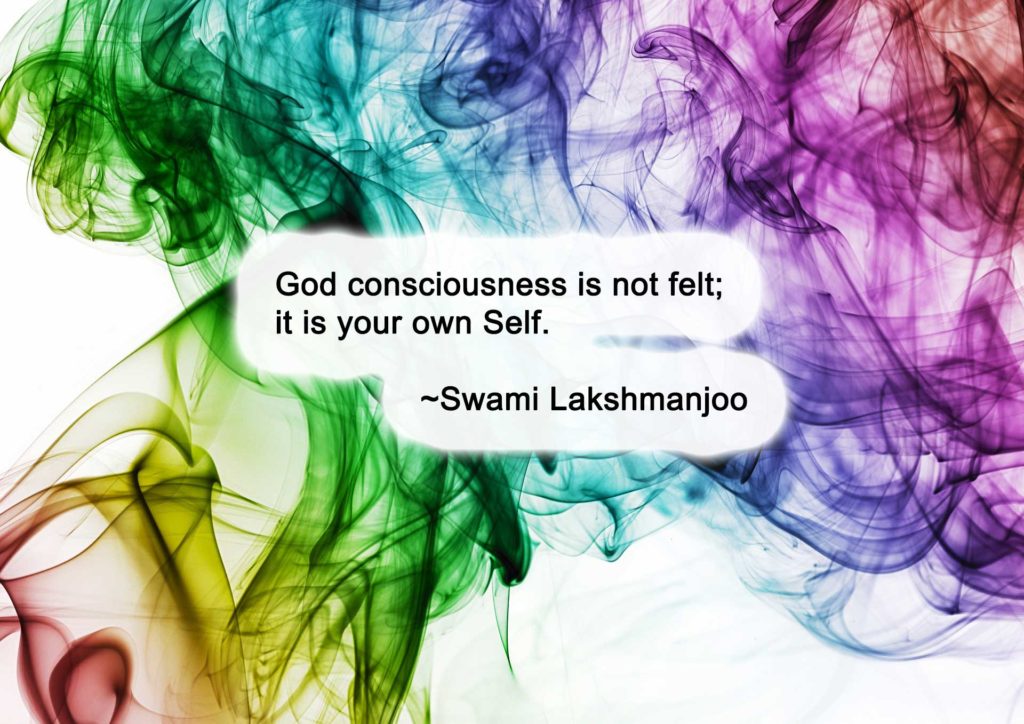
This is the question of Devī.
परापरायाः सकलम्
अपरायाश्च वा पुनः ।
पराया यदि तद्वत्स्यात्
परत्वं तद्विरुध्यते ॥५॥
parāparāyāḥ sakalam
aparāyāśca vā punaḥ /
parāyā yadi tadvatsyāt
paratvaṁ tad...

